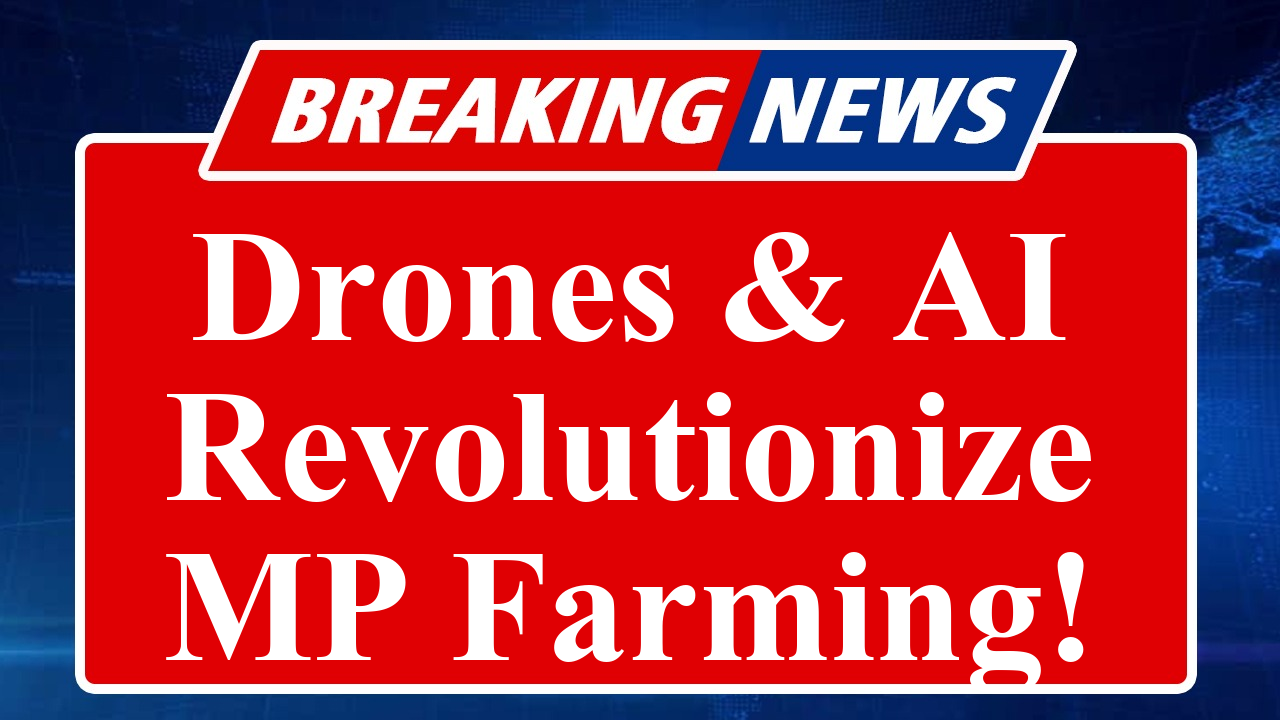“Madhya Pradesh is transforming agriculture with drones and AI under new schemes, boosting productivity and sustainability. Government subsidies and training programs empower farmers, while AI-driven analytics enhance crop management. The initiative aims to modernize farming, reduce costs, and increase yields, positioning MP as a leader in India’s agri-tech movement.”
Madhya Pradesh Farmers Adopt Drones and AI for Smarter Farming
Madhya Pradesh is witnessing a significant shift in its agricultural landscape as the state government rolls out ambitious agri-tech schemes promoting drones and artificial intelligence (AI) to empower farmers. These initiatives, backed by substantial subsidies and training programs, aim to enhance productivity, reduce operational costs, and promote sustainable farming practices across the state.
The Madhya Pradesh government has introduced schemes under the Sub-Mission on Agricultural Mechanization, offering subsidies of up to 50% on agricultural drones and machinery. Farmers can apply for these benefits through the state’s online portal, with deadlines extending to mid-July 2025. Drones, equipped with GPS and AI-enabled programming, are being used for precision spraying, crop monitoring, and soil health assessment. These technologies enable farmers to cover an acre in under 10 minutes, reducing pesticide use by 20–30% and water consumption by up to 90% compared to traditional methods.
AI is playing a pivotal role in transforming farming practices in Madhya Pradesh. Machine learning-based crop recommendation systems analyze soil data, weather patterns, and market trends to guide farmers on optimal crop choices. The state is collaborating with agritech startups and research institutions to deploy AI tools like predictive analytics for irrigation planning and pest alerts. For instance, platforms like VISTAAR, inspired by Maharashtra’s MahaAgri-AI Policy, provide multilingual advisories to farmers, integrating with national systems like Agristack for seamless data sharing.
The Drone-as-a-Service (DaaS) model is gaining traction in Madhya Pradesh, allowing farmers to rent drones instead of purchasing them, thus lowering upfront costs. Rural youth are being trained as drone operators, creating new job opportunities and fostering agri-tech entrepreneurship. In districts like Vidisha and Sagar, pilot projects have demonstrated success in bollworm detection and targeted spraying, saving farmers significant time and resources.
The central government’s Kisan Drone Scheme complements state efforts, providing additional funding to promote drone adoption among smallholder farmers, who constitute the majority in Madhya Pradesh. The state’s agriculture department is also establishing High-Tech Hubs for Custom Hiring, enabling farmers to access advanced equipment at subsidized rates. These hubs offer tools like combine harvesters, pneumatic planters, and drones, making mechanized farming accessible to small and marginal farmers.
However, challenges remain. Limited regulatory approvals for aerial agrochemical applications and the need for quality assurance in drone operations pose hurdles. Poor-quality drones or untrained operators can lead to uneven spraying and crop damage, risking farmer trust. The state government is addressing these concerns by setting up specialized AI labs in agricultural universities and launching digital literacy programs to train farmers and extension workers.
Madhya Pradesh’s push for agri-tech aligns with India’s broader vision of self-reliance in technology. The state is drawing inspiration from national initiatives, such as the Ministry of Electronics and Information Technology’s plan to deploy 15 AI models for agriculture by late 2025. These models will offer real-time weather data, soil analysis, and pest management solutions tailored to regional needs. Madhya Pradesh aims to integrate these tools into its farming ecosystem, ensuring farmers benefit from cutting-edge innovations.
Farmers in the state have expressed cautious optimism. Anil Sharma, a farmer from Bhopal, noted, “Drones save time and reduce my costs, but we need more training to use them effectively.” The government’s focus on capacity building, with a budget allocation for farmer training, aims to bridge this gap. By 2026, Madhya Pradesh plans to expand successful pilot projects to all districts, integrating AI tools with national digital platforms for a unified approach.
The state’s investment in agri-tech is expected to boost its agricultural output, which is critical for India’s food security. With over 145 million small farms nationwide, Madhya Pradesh’s model could set a precedent for other states. The combination of drones, AI, and policy support is paving the way for a new era of farming, where technology empowers farmers to achieve higher yields and sustainable practices.
Disclaimer: This article is based on recent news reports, government announcements, and agritech industry insights. Information is sourced from credible outlets like The Hindu BusinessLine, Economic Times, and Times of India. Readers are advised to verify subsidy details and application processes through official government portals.

